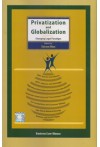- Author(s): Sairam Bhat
- Publisher: Eastern Law House
- Edition: Ed 2017
- ISBN 13 9788171773305
- Approx. Pages 500 + Contents
- Delivery Time Normally 7-9 working days
............................................................................................................................
Description
The Liberalization, Privatization and Globalization (LPG) Policy was considered the window of great opportunity for India to formally enter into international market as a potential contender. The year 1991 dawned with an economic crisis in the country; it was by virtue of this divergent LPG Policy aimed at opening new avenues for the economy to grow. The book analyses the trends and policy dimensions of privatization and focuses on the growth and impact of global policy on the Indian legal system. It traces the era before the introduction of this policy and then charts the journey of international and comparative perspective including environmental protection, dispute settlement in trade laws and the objectives of passing competition law in India. It also puts forward the discussion on business and human rights, ADR mechanism and, most importantly, the changing role of the government in response to economic liberalization. A few deliberations have been put together on the issues of labour organizations, agricultural and pharmaceutical laws, interconnected with Intellectual Property Rights. Covering almost all the main areas of probable changes, the book justifies its genesis as changing the legal paradigm of post-liberalization and globalization.
............................................................................................................................
Contents
PART I: DEVELOPMENTS IN CONSTITUTIONAL LAW
Chapter 1: Non-profit Sector's Response to Globalization - Towards Alleviation of
Difficulties and Empowerment of the Vulnerable
Chapter 2: Illicit Financial Flows, Globalization and the Rule of Law
Chapter 3: Impact of Liberalization on the State, the Judiciary and the People
Chapter 4: Constitutional Response to Economic Liberalization
PART II: REGULATORY DEVELOPMENTS
Chapter 5: The Competition Law Regime in post-1991 Economic Scenario in India
Chapter 6: Regulating Cartels - Challenges for Competition Law
Chapter 7: Abuse of Dominant Position under Competition Law
Chapter 8: Enforcement of Competition Law in India Through Private Action for Damages
Chapter 9: Global Regulatory Compliance for Transnational Corporations
Chapter 10: Competition Law and Consumer Welfare
Chapter 11: Energy Sector Regulation in India
PART III: HUMAN RIGHTS & JUSTICE PERSPECTIVE
Chapter 12: Impact of Liberalization on Worker's Legitimate Rights
Chapter 13: Strategic Labour Organizing, Law and the Rise of Non-Traditional
Forms of Worker Organization
Chapter 14: Achieving Justice via Independent and Impartial Tribunals or Forums
Chapter 15: Neo-liberal National Security - Wielding Counter terrorism Powers to
Protection Economic Growth
Chapter 16: Human Rights' Anti-Globalization in a Multi-national Corporatized State
Chapter 17: The Role of Human Rights Against Poverty
Chapter 18: The Impact of Trade Liberalization on Human Rights
Chapter 19: Transparency and Accountability in Governance and Public Services
Chapter 20: Promoting Decent Work Agenda - A Human Rights Discourse in the
Wake of Globalization
Chapter 21: Economic Liberalization and Impact on Human Rights
PART IV: INTERNATIONAL TRADE CONCERNS
Chapter 22: Myanmar, TRIPS and Food Security
Chapter 23: Energy Security and Global Trade - The View from Oil Dependent Economies
Chapter 24: WTO - Challenges, Approaches and Future Trend
Chapter 25: International Commercial Arbitration - A Tool to Regulate Global Trade and Commerce
Chapter 26: Third Parties Rights in the WTO Dispute Settlement Mechanism
Chapter 27: Regulating in the Shadow of International Trade Law
Chapter 28: The Function of India's Patent Institution to Promote Pharmaceutical Industry
Chapter 29: 'Make in India' Policy in the Era of Global Trade Regime - A Critical Analysis
Chapter 30: Paradigm Shift of India's Economic Policies and Institutional Reforms
Chapter 31: Article XX(b), GATT - A 'Rule of Law' Perspective
Chapter 32: To Reform or Not to Reform - The Looming Questions Facing WTO's Future Credibility
............................................................................................................................

